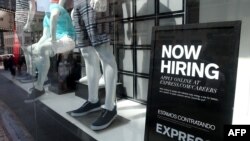WASHINGTON —
U.S. retail sales rose less than expected in May and first-time applications for unemployment benefits increased last week, but that will probably do little to change views that the economy is regaining momentum.
The Commerce Department said on Thursday retail sales gained 0.3 percent last month. While that was below economists' expectations for a 0.6 percent rise, April's retail sales were revised to show a 0.5 percent increase.
Retail sales, which account for a third of consumer spending, had previously been reported have gained 0.1 percent in April.
In a separate report, the Labor Department said initial claims for state unemployment benefits climbed 4,000 to a seasonally adjusted 317,000 for the week ended June 7.
With job growth rising solidly in May and manufacturing and services industries expanding strongly, the retail and jobless claims reports probably will not cause too much anxiety.
U.S. stock index futures edged lower on the data, while prices for U.S. Treasury debt rose.
The economy added 217,000 jobs in May, the fourth straight month of job gains above 200,000. It has recouped all the 8.7 million jobs lost during the recession. The unemployment rate held steady at a 5-1/2 year low of 6.3 percent.
Economic growth in the second quarter is expected to top a 3.0 percent annual pace after contracting at a 1.0 percent rate in the January-March period.
So-called core retail sales, which strip out automobiles, gasoline, building materials and food services, and correspond most closely with the consumer spending component of gross domestic product, were unchanged last month.
However, they were revised to show a 0.2 percent rise in April, instead of the previously reported 0.1 percent dip.
In May, consumers bought automobiles, lifting receipts at auto dealerships 1.4 percent. Excluding autos, retail sales rose 0.1 percent in May.
There were solid gains in sales at building materials and garden equipment stores, as well as receipts at non-store retailers, which include online sales. An increase in pump prices pushed up sales at gasoline stations.
There were, however, marginal declines in receipts at sporting goods shops, electronics and appliances stores, as well as at clothing retailers and restaurants and bars.
In another report, the Labor Department said import prices edged up 0.1 percent last month after falling 0.5 percent in April. In the 12 months through May, prices increased 0.4 percent, advancing for the first time since July.
A sluggish global economy and slack in the domestic labor market is keeping inflation pressures muted, giving the Federal Reserve room to keep its ultra-easy monetary policy for a while.
The U.S. central bank slashed overnight interest rates to a record low of zero to 0.25 percent in December 2008 and is not expected to start raising them before the second half of 2015.
The Commerce Department said on Thursday retail sales gained 0.3 percent last month. While that was below economists' expectations for a 0.6 percent rise, April's retail sales were revised to show a 0.5 percent increase.
Retail sales, which account for a third of consumer spending, had previously been reported have gained 0.1 percent in April.
In a separate report, the Labor Department said initial claims for state unemployment benefits climbed 4,000 to a seasonally adjusted 317,000 for the week ended June 7.
With job growth rising solidly in May and manufacturing and services industries expanding strongly, the retail and jobless claims reports probably will not cause too much anxiety.
U.S. stock index futures edged lower on the data, while prices for U.S. Treasury debt rose.
The economy added 217,000 jobs in May, the fourth straight month of job gains above 200,000. It has recouped all the 8.7 million jobs lost during the recession. The unemployment rate held steady at a 5-1/2 year low of 6.3 percent.
Economic growth in the second quarter is expected to top a 3.0 percent annual pace after contracting at a 1.0 percent rate in the January-March period.
So-called core retail sales, which strip out automobiles, gasoline, building materials and food services, and correspond most closely with the consumer spending component of gross domestic product, were unchanged last month.
However, they were revised to show a 0.2 percent rise in April, instead of the previously reported 0.1 percent dip.
In May, consumers bought automobiles, lifting receipts at auto dealerships 1.4 percent. Excluding autos, retail sales rose 0.1 percent in May.
There were solid gains in sales at building materials and garden equipment stores, as well as receipts at non-store retailers, which include online sales. An increase in pump prices pushed up sales at gasoline stations.
There were, however, marginal declines in receipts at sporting goods shops, electronics and appliances stores, as well as at clothing retailers and restaurants and bars.
In another report, the Labor Department said import prices edged up 0.1 percent last month after falling 0.5 percent in April. In the 12 months through May, prices increased 0.4 percent, advancing for the first time since July.
A sluggish global economy and slack in the domestic labor market is keeping inflation pressures muted, giving the Federal Reserve room to keep its ultra-easy monetary policy for a while.
The U.S. central bank slashed overnight interest rates to a record low of zero to 0.25 percent in December 2008 and is not expected to start raising them before the second half of 2015.





